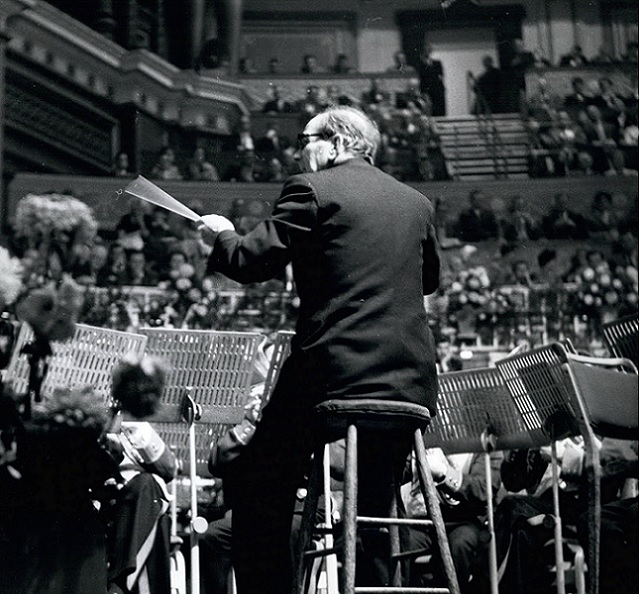
The Force of Mortimer's destiny: Sitting to direct CWS (Manchester) to victory at the 1962 National (copyright: Alamy)
22: Alex Mortimer (1905 - 1976)
Mercurial is an adjective too often used to describe people who do not fit the orthodoxies of tick-box certainty. It's also become the descriptive excuse to accommodate boorish levels of behaviour, especially in the sports and art worlds.
It ignores the fact that the true enfant-terrible, diva, prima donna and maestro all have a common helix thread built into their DNA.
Unquestionable talent.
Complex
Alex Mortimer was truly mercurial; complex and volatile, temperamental, capricious and fickle. At his best he was inspired to levels few could match – a true brass band genius. At his worst, he was, as more than one player was to call him, ‘a right bastard’.
His talent was distilled by determination and resentment – through a father who demanded everything in pursuit of musical perfection and an elder brother for whom success seemed effortless.
One of five children (there were also two daughters) the Mortimer brothers were as different in character to a point that as former Foden’s Band Manager Allan Littlemore once said – it was almost as if they weren’t even related.
His talent was distilled by determination and resentment – through a father who demanded everything in pursuit of musical perfection and an elder brother for whom success seemed effortless.
Harry (1902-1992) was suave, charming and acutely aware of the route he needed to take to fulfil his expansive ambitions. Rex (1911-1999) was diffident and enclosed – a polar opposite. Foden’s was his life.
Alex was simply cut from a different cloth. The mercury that ran in his veins attracted him to very different musical compass points.
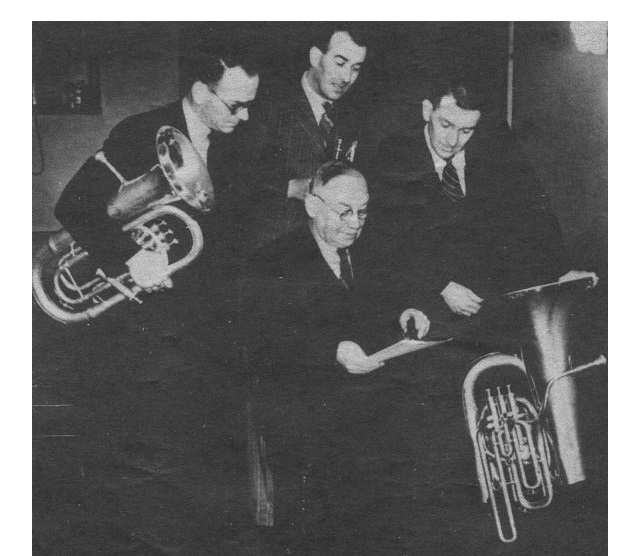
The Mortimer siblings with their father
Begrudging respect
Like brothers they argued and fought; the animosity of the older siblings at times balanced only by their hard bitten, almost begrudging respect (all three never competed against each other at a single contest).
Although Alex himself described himself as “a musical navvie”, in his autobiography ‘On Brass’ written in 1981, Harry said that Alex was, "a brilliant musician. I think, really, he was the best musician of the four of us."
Perhaps he was right. By then he had been dead five years. The generosity did however come with that ‘I think’ caveat.
Although Alex himself described himself as “a musical navvie”, in his autobiography ‘On Brass’ written in 1981, Harry said that Alex was, "a brilliant musician. I think, really, he was the best musician of the four of us."
Harry beat Alex four times out of five at London and never lost to him at the Open. Famously after Fairey won the 1956 Open under Major George Willcocks (Harry was in Australia after the BBC insisted he no longer compete at contests), Alex caustically remarked that he had even managed to beat him from 12,000 miles away.
Rheumatic fever
Alex was born in Hebden Bridge, Yorkshire in 1905.
He first made a name for himself as a cornet player with the Luton Red Cross Band after the family moved there at the instigation of William Halliwell.
As youngster Alex suffered from rheumatic fever which seriously strained his heart. He stopped playing completely until he was 15. When he returned, Harry was already the deus ex machina cornet star. Perhaps knowing that he could never make up lost ground, he took to the euphonium. It was a wise move.
When he returned, Harry was already the deus ex machina cornet star. Perhaps knowing that he could never make up lost ground, he took to the euphonium. It was a wise move.
Alex eventually became second euphonium in the Luton Red Cross Band. In 1923, with the Mortimer clan installed, they won the National Championship title at Crystal Palace.
At this point, both Halliwell and Fred Mortimer held the view that Alex should be moved to the end chair. Even Harry, described him as 'the finest euphonium player I have ever heard'. The band committee would have none of it.
It was a decision they were to rue.
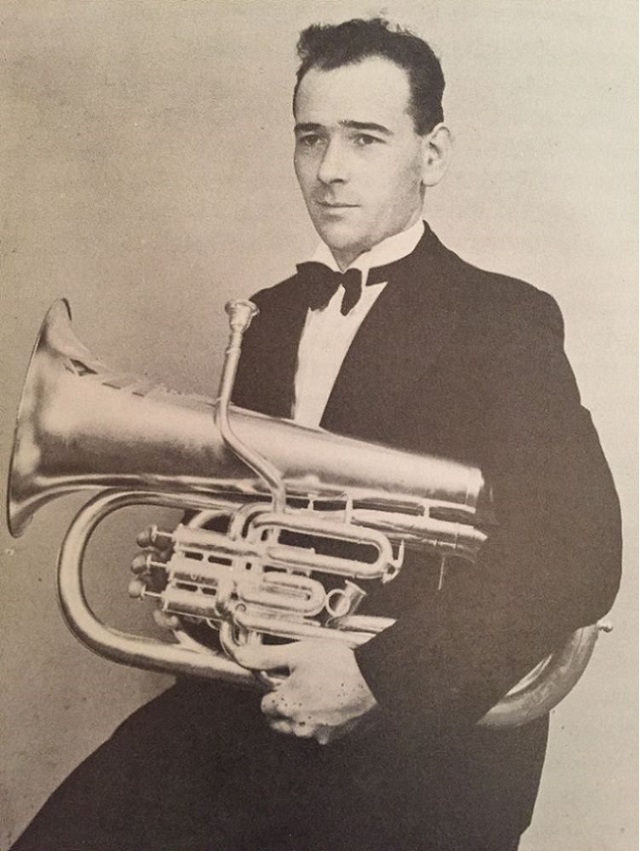
The euphonium star of Foden's
Feared
When Foden’s Motor Works needed a solo euphonium Alex was offered the job. Aged 19, he later admitted he found the task daunting. Foden’s were yet to become all-conquering but were still feared – and not only because of the music making. It also came with a job in the factory.
Even there though, he had to defer to his brother, although as Eric Ball recalled in seeing them play at Crystal Palace, they sat in their seats before a note was played, “staring at each other”.
Some years later it was a persuasive tool he himself used with almost dictatorial authority to instil fear and excellence into the hearts of players when he became Musical Director of CWS (Manchester) Band.
In 1924, the rest of the Mortimers packed their bags and headed to Sandbach.
Staring
Whilst at Foden’s, Alex was part of a Belle Vue hat-trick (1926/27/28) and seven National Championship tiles (1930, 1932/33/34 and 1936/37/38).
Even there though, he had to defer to his brother, although as Eric Ball recalled in seeing them play at Crystal Palace, they sat in their seats before a note was played, “staring at each other”.
And where Harry was perhaps the most recorded cornet player of his generation, Alex was heard just the once - performing his own arrangement of ‘Drinking - In Cellar Cool’.
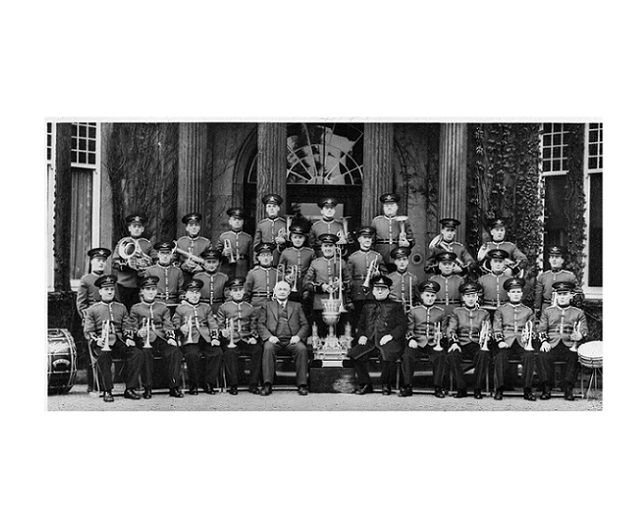
Foden's Motor Works in their pomp
Different world
He continued to play with Foden’s until July 1943, but by then he had already ventured into a different world, joining the Halle Orchestra in 1929 as a tuba player. A decade later he became a member of the Liverpool Philharmonic Orchestra and played with the BBC Northern Orchestra.
His conducting apprenticeship was served with the likes of Crewe Steam Sheds Band at the May Belle Vue contest between 1935 and 1937, before he returned to take the I.C.I. Band to the same event a decade later.
Soon his talent (and reputation for hard, exceptionally detailed preparation) made him a sought-after figure.
In 1949, he joined Scottish CWS Band as their conductor, taking them to the Edinburgh International contest before Black Dyke appointed him as Musical Director.
However, following his brother proved to be an almost impossible task.
Huge differences
As the late Denzil Stephens recalled, the differences in musical approach were huge.
With Harry there was “little fuss”. Alex though was, “a different person altogether. He was a band trainer. He would get the utmost detail out of a piece; he would dissect it and put it together again."
With Harry there was “little fuss”. Alex though was, “a different person altogether. He was a band trainer. He would get the utmost detail out of a piece; he would dissect it and put it together again."
However, he also felt it led to a form of sheer bloody-mindedness.
“Alex used to get some wonderful performances, but at other times he wasn’t as good. He would exaggerate nuances, exaggerate balances, exaggerate tempos - he sometimes used to take things so fast that he would leave us all breathless at the end.
Harry would never do that - he was a much more sensible chap."
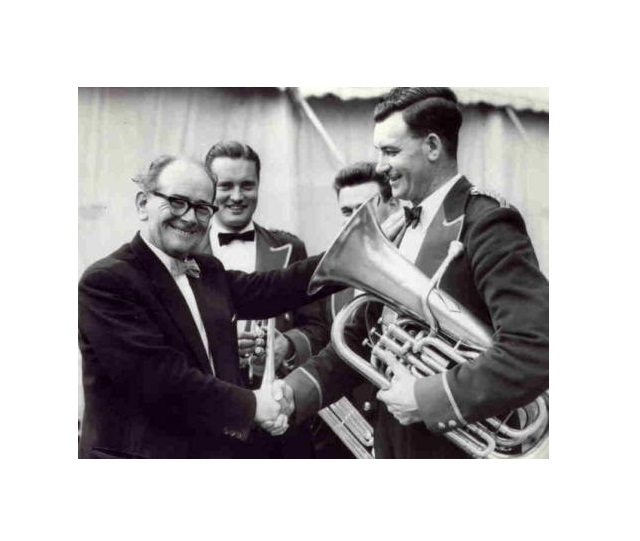
The maker of great players...
Iron-willed DNA
Alex's success at Black Dyke was limited to the 1951 National. In his book, ‘150 Glorious Years’, Roy Newsome suggested that Queensbury at the time was “no place” for anyone who “did not have a strong constitution.”
He infers in the wrong direction. Harry’s influence was perhaps simply too imposing for him to successfully overcome. Alex needed a band to imprint his very particular brand of iron-willed DNA.
In 1954, he joined CWS (Manchester). The lure of an employed wage, a busy schedule and the ability to make the all-important decisions over players gave him just what he wanted.
It also drove him to the point of complete exhaustion, and many players to the point of giving up all together. But in doing so he built a truly remarkable band.
Cost
It came though at a cost, as soprano player Bert Howarth echoed the views of Denzil Stephens: "Alex was good at definition and theory. He could pull music to pieces - every little note and why it was there. He was a fine band trainer.”
"Alex never liked soprano players. Sopranos are colour players. Alex Mortimer never let me stand out. Harry let me play at Faireys and as a result I improved."
Eventually though he tired of his mercurial machinations and left.
"Alex never liked soprano players. Sopranos are colour players. Alex Mortimer never let me stand out. Harry let me play at Faireys and as a result I improved."
Never bored
However, another soprano player (converted from repiano by Mortimer’s psychology) was the legendary, Brian Evans, who although acknowledging his faults was also mesmerised by his talent.
"Alex was so precise," he said, “You had to play every piece right. Everyone hated him, but they all admired him. I think he was a brass band genius."
Others held the same opinion – although grudgingly. Apparently Black Dyke players used follow the Co-op at the major contests to find out “what the old bastard's going to do today”.
Evans later said that in the decade he was under his baton, three rehearsals a week and a full calendar of jobs, not once was he bored.
Others held the same opinion – although grudgingly. Apparently Black Dyke players used follow the Co-op at the major contests to find out “what the old bastard's going to do today”.
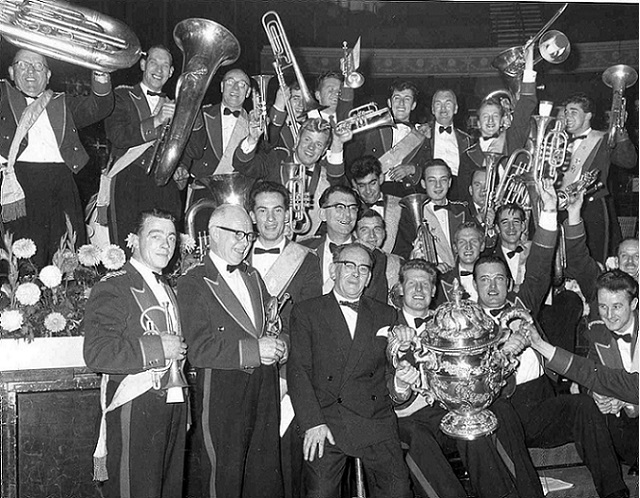
The 1962 National triumph
Special
One man who perhaps knew his psychology better than anyone was Derek Garside, who for 18 years was his principal cornet.
"Alex Mortimer could make a player even if he was using a gas pipe,” he said. “He was special. A bit like Alex Ferguson. He would be friendly one minute, an ogre the next. He could frighten you to death and then coax the best out of you.
Some couldn't stand his methods, but there's no one like him around today."
Those methods were imposed on mammoth summer tours of up to 13 weeks where Mortimer surreptitiously took the opportunity perform the forthcoming Belle Vue test piece to an unknowing audience.
Etheral quality
As Gordon Higginbottom later recalled: "I remember we played Leidzen's ‘Sinfonietta’ at Swansea, after only half an hour’s rehearsal. Alex announced it as a new number called ‘Muldoon's Picnic’.”
In the book ‘Brass Bands in the 20th Century’ co-author Violet Brand wrote that Alex Mortimer, “cultivated in the CWS Band an ethereal quality of sound, which was quite unbelievable in a brass band.”
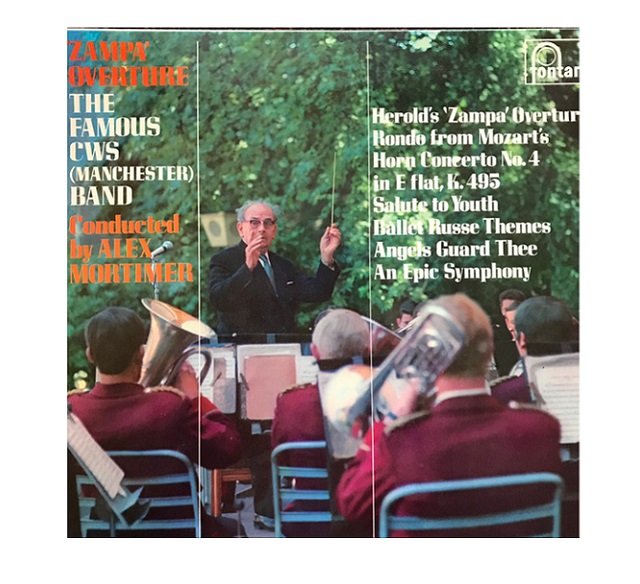
Bandstand brilliance...
Brand analysis
In the summers of the early 1960s Londoners would crowd into the Embankment Gardens to listen in awe.
She wrote, "If one spoke to Alex for an extended period, one ceased to wonder at his remarkable influence on a brass band. The springs of beauty were within him and his quizzical sense of humour was a delight."
Her husband, Geoffrey, went to listen to out of curiosity on a Sunday afternoon. He never missed a note for the rest of the week.
Her husband, Geoffrey, went to listen to out of curiosity on a Sunday afternoon. He never missed a note for the rest of the week.
Frustratingly a major contest success at the British Open and National eluded the partnership until a win at Belle Vue in 1960 heralded the start of the peak years of the best CWS (Manchester) Band of all time.
Greatness
The memorable Albert Hall victories of 1962 and 1963 confirmed their greatness – the first imbued with a legendary drama, as Derek Garside later recalled.
“The 1962 win was very special. Alex was very bad suffering from a mixture of exhaustion and depression. It was only the drugs that allowed him to conduct."
He didn’t conduct or anything. He started us, took us through the sticky section and finished us! The rest of the time, he was just sitting on this stool.”
Another player, Jack Howarth, recalled that Mortimer came to their final rehearsal (they drew 23 on the day) at the Royal College of Organists and conducted stretched out on two kitchen tables.
“From there we went to the Royal Albert Hall, and, when we went on, they brought this high stool out and he came and sat down in front of us!
He stood up to start us on ‘Force of Destiny’ - just three notes - and then sat down again. Halfway through, there’s this sticky passage of semi-quaver runs.
He stood up for that and then sat down again until the end of the piece. He didn’t conduct or anything. He started us, took us through the sticky section and finished us! The rest of the time, he was just sitting on this stool.”
He had to be helped off stage by his players.
Sit-down conductor
The Daily Herald headline of Monday after the contest read: “Triumph for the sit -down conductor." Alfred Mackler reported that “a sick man left his bed to help the CWS (Manchester) Band win the National title.”
A year later they retained the title on ‘Belmont Variations’ before winning the Open on ‘A Downland Suite’ in 1966.
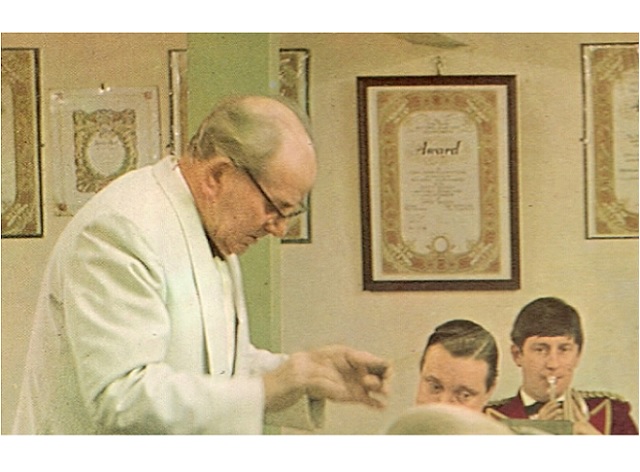
The mercurial master at work...
Poor health
It was to be the last major triumph, and although they were still regarded as a band to beat, the unique mercurial magic had started to dissipate in his veins.
Poor health caught up with him and in late 1970, at the age of 65 he retired as musical director of the CWS (Manchester) Band, although he made his final contest appearance with them at the 1972 National. They came 20th.
Alex Mortimer was a true mercurial talent – one whose complexities, all too real, brought the best and worst out of him.
In 1960 he was awarded the Medal of the Worshipful Company of Musicians for his outstanding musicianship, and in 1963 was highlighted in the 'Spotlight on Service' ceremony at the Nationals at the Royal Albert Hall.
Alex Mortimer was a true mercurial talent – one whose complexities, all too real, brought the best and worst out of him.
Final record
His final record included three National titles and two British Opens. In addition, he also won 13 regional titles (nine with CWS Manchester, three with Scottish Co-op and one with Black Dyke).
It should and could have been more. Harry beat him on all accounts. It rankled with him to his final day.
Alex Mortimer died on Wednesday, 14th January 1976, at the age of 70. His death was not reported in the banding press until almost a month later. A memorial concert was held in New Century Hall, Manchester in the May.
Willie Barr, the principal cornet during his time with Scottish CWS wrote in a tribute in the 'British Bandsman' that; “I am sure when I say our lives would not have been quite the same without his influence, and we shall never see his like again.”
That much is true.
Tim Mutum
4BR Hall of Fame: No.1: Jack Atherton
https://www.4barsrest.com/articles/2019/1832.asp
4BR Hall of Fame: No.2: Albert Baile
https://www.4barsrest.com/articles/2019/1836.asp
4BR Hall of Fame: No.3: Stanley Boddington
https://www.4barsrest.com/articles/2019/1842.asp
4BR Hall of Fame: No.4: Bram Gay
https://www.4barsrest.com/articles/2020/1848.asp
4BR Hall of Fame: No.5: Leonard Lamb
https://www.4barsrest.com/articles/2020/1855.asp
4BR Hall of Fame: No.6: Arthur Stender
https://www.4barsrest.com/articles/2020/1866.asp
4BR Hall of Fame: No.7: Violet Brand
https://www.4barsrest.com/articles/2020/1871.asp
4BR Hall of Fame: No.8: Eric Bravington
https://www.4barsrest.com/articles/2020/1875.asp
4BR Hall of Fame: No.9: Norman Ashcroft
https://www.4barsrest.com/articles/2020/1879.asp
4BR Hall of Fame: No.10: Albert Chappell
https://www.4barsrest.com/articles/2020/1884.asp
4BR Hall of Fame: No.11: Betty Anderson
https://www.4barsrest.com/articles/2020/1889.asp
4BR Hall of Fame: No.12: Trevor Walmsley DFC
https://www.4barsrest.com/articles/2020/1897.asp
4BR Hall of Fame: No.13: Percy Code
https://www.4barsrest.com/articles/2020/1903.asp
4BR Hall of Fame: No.14: George Thompson MBE
https://www.4barsrest.com/articles/2020/1909.asp
4BR Hall of Fame: No.15: Willie Lang
https://www.4barsrest.com/articles/2020/1914.asp
4BR Hall of Fame: No.16: James Scott
https://www.4barsrest.com/articles/2021/1916.asp
4BR Hall of Fame: No.17: Jack Mackintosh
https://www.4barsrest.com/articles/2021/1922.asp
4BR Hall of Fame: No.18: Teddy Gray
https://www.4barsrest.com/articles/2021/1928.asp
4BR Hall of Fame: No.19: Rowland Jones
https://www.4barsrest.com/articles/2021/1932.asp
4BR Hall of Fame: No.20: Helen Perkin
https://www.4barsrest.com/articles/2021/1944.asp
4BR Hall of Fame: No.21: Lt Col Cecil H Jaeger OBE
https://www.4barsrest.com/articles/2021/1954.asp













